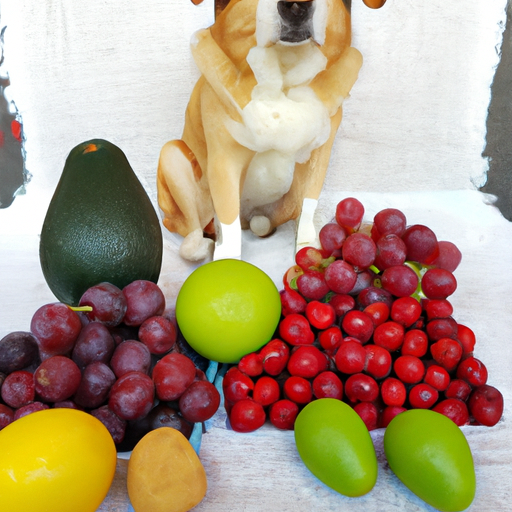As a devoted caregiver, you are keen to know what foods are safe for your beloved canine companion. In this comprehensive guide, we are going to delve deep into the world of fruits, specifically focusing on those that are not safe for your dog to consume.
1. Grapes and Raisins
Grapes and raisins are toxic to dogs and can cause kidney failure. Just a small amount can make a dog sick. Vomiting is often the first symptom, usually within a couple of hours, followed by diarrhea.
2. Avocados
While avocado may be a healthy superfood for humans, it’s not safe for dogs. The pit, skin, and leaves of avocados contain Persin, a toxin that often causes vomiting and diarrhea in dogs.
3. Citrus Fruits
Citrus fruits like lemons, limes, and grapefruit as well as persimmons can cause an upset stomach in dogs. The seeds and peels of these fruits are especially harmful.
4. Cherries
Cherries are toxic to dogs. Their pits, stems, and leaves contain cyanide, which is poisonous and potentially lethal if consumed in large amounts.
5. Apple Seeds
While the flesh of an apple is not harmful to dogs, the seeds contain a natural chemical that releases cyanide when digested. It’s best to thoroughly core and seed apples before giving them to dogs.
Here’s a quick reference table for you:
| Fruit | Toxic Part |
|---|---|
| Grapes/Raisins | Whole fruit |
| Avocados | Pit, Skin, Leaves |
| Citrus Fruits | Seeds, Peels |
| Cherries | Pits, Stems, Leaves |
| Apples | Seeds |
Frequently Asked Questions
1. Can dogs eat bananas?
Yes, bananas are safe for dogs in moderation. They are high in potassium, vitamin B6, and vitamin C.
2. Are strawberries safe for dogs?
Yes, strawberries are safe for dogs to eat. However, they should be given in moderation due to their high sugar content.
3. Can dogs eat watermelon?
Yes, dogs can eat watermelon, but be sure to remove the seeds and rind.
4. Are Blueberries safe for dogs?
Yes, blueberries are safe and nutritious for dogs. They are a good source of fiber, antioxidants, and vitamins.
5. Can dogs eat pears?
Yes, dogs can safely eat pears. However, like with apples, the seeds should be removed as they contain traces of cyanide.
Remember, while fruits can be a healthy snack for your dogs, they should not make up more than 10% of their daily caloric intake. Always consult with your vet if you have any concerns about your dog’s diet.



